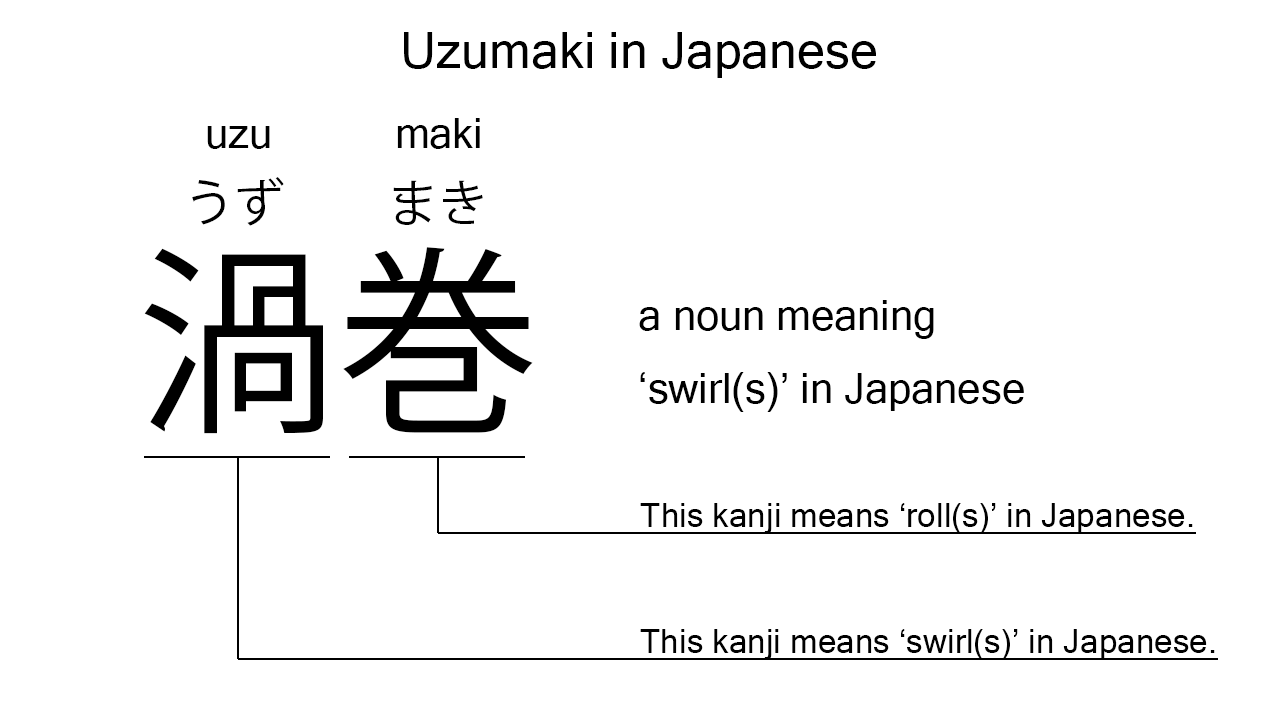What does “uzumaki” mean in Japanese?
Native speakers use uzumaki often to mean a ‘swirl’ in Japanese. Perhaps, some Japanese learners know this word as it is sometimes used in Japanese movies, songs, novels, manga, anime, and the like. In this blog post, however, I’m explaining this word in detail based on its kanji expression. And also, I’m explaining how to use it through example sentences. My explanations would help Japanese learners understand uzumaki more clearly. Then, let’s get started!
Contents
Definition and meanings of “uzumaki”
Let me start with the definition and meanings of uzumaki.
- uzumaki – 渦巻 (うずまき) : a noun meaning a ‘swirl’ or ‘whirl’ in Japanese. This can also work as plural. Learn more about Japanese plural.
Japanese native speakers use this noun normally to refer to spinning movements of water or other liquid. So, the usage is similar to that of the English noun, swirl, I think.
The definition and meanings are not that difficult. To understand this noun more clearly, however, let me explain its kanji characters in detail, one by one.
Uzumaki in kanji
The kanji expression of uzumaki consists of the following two kanji characters:
- 渦 : a kanji character used to mean a ‘swirl’, ‘whirl’, or ‘eddy’ in Japanese.
- 巻 : a kanji character used to mean a ‘roll’, ‘scroll’, or such in Japanese. This can also be found in other words like tatsumaki.
From these two kanji characters, we can understand that uzumaki literally means a ‘swirl and roll’ in Japanese. This literal interpretation is very close to the actual meanings, I think.

When we meet new kanji expressions, we should check their kanji characters in detail to understand their meanings clearly and deeply. In many cases, kanji characters tell us a lot about the meanings of the expressions they form. Actually, here, we could get the better understanding of uzumaki through the detailed kanji check above.
So far, I’ve explained the definition and meanings of uzumaki together with its kanji characters. Then, let me explain how to use it through the example sentences below.
How to say “swirl” in Japanese
boku wa mizu no uzumaki wo mitsuke ta – 僕は水の渦巻を見つけた (ぼくはみずのうずまきをみつけた)
I found a swirl of water.
Below are the new words used in the example sentence.
- boku – 僕 (ぼく) : a pronoun meaning ‘I’ in Japanese. This is used mainly by boys and young males.
- wa – は : a binding particle working as a case marker or topic marker. In the example, this works after boku to make the subject in the sentence.
- mizu – 水 (みず) : a noun meaning ‘water’ in Japanese.
- no – の : a case particle used to join two nouns. Normally, the first one can work as a modifier to describe the second. In the example, this is used to join mizu and uzumaki. The formed phrase literally means a ‘swirl of water’ in Japanese. Word orders in Japanese and English are different, but the role of this case particle is similar to that of the English preposition, of.
- wo – を : a case particle used to make the object word in a sentence. In the example, this is used after mizu no uzumaki to make the object in the sentence.
- mitsuke – 見つけ (みつけ) : one conjugation of the verb, mitsukeru, which means ‘to find’ in Japanese. In the example, it has been conjugated for the better connection with its following word.
- ta – た : an auxiliary verb used after a verb, adjective, or auxiliary verb to make its past tense form. In the example, this is used after mitsuke to make its past tense form, mitsuke ta.
This is a typical usage of uzumaki. In this example, it works as a part of the noun phrase, mizu no uzumaki, which means a ‘swirl of water’ in Japanese.
Another example of “uzumaki”
nami ga uzumaki wo tsukut ta – 波が渦巻を作った (なみがうずまきをつくった)
The waves formed the swirl.
Below are the new words used in the example sentence.
- nami – 波 (なみ) : a noun meaning a ‘wave’ in Japanese. This can also work as plural.
- ga – が : a case particle used to make the subject word or the object word in a sentence. In the example, this is used after nami to make the subject in the sentence.
- tsukut – 作っ (つくっ) : one conjugation of the verb, tsukuru, which means ‘to make’ or such in Japanese. In the example, it has been conjugated for the better connection with its following word.
This is another example of uzumaki. When we want to mean a ‘swirl’ or ‘swirls’ in Japanese, this noun is always a good option.
Summary
In this blog post, I’ve explained the definition and meanings of uzumaki in detail based on its kanji expression. And also, I’ve explained how to use it through the example sentences. Let me summarize them as follows.
- uzumaki – 渦巻 (うずまき) : a noun meaning a ‘swirl’ or ‘whirl’ in Japanese. This can also work as plural. Japanese native speakers use this noun normally to refer to spinning movements of water or other liquid. These two kanji characters literally mean a ‘swirl and roll’ in Japanese. This literal interpretation is very close to the actual meanings, I think.
Hope my explanations are understandable and helpful for Japanese learners.
Leave a Reply